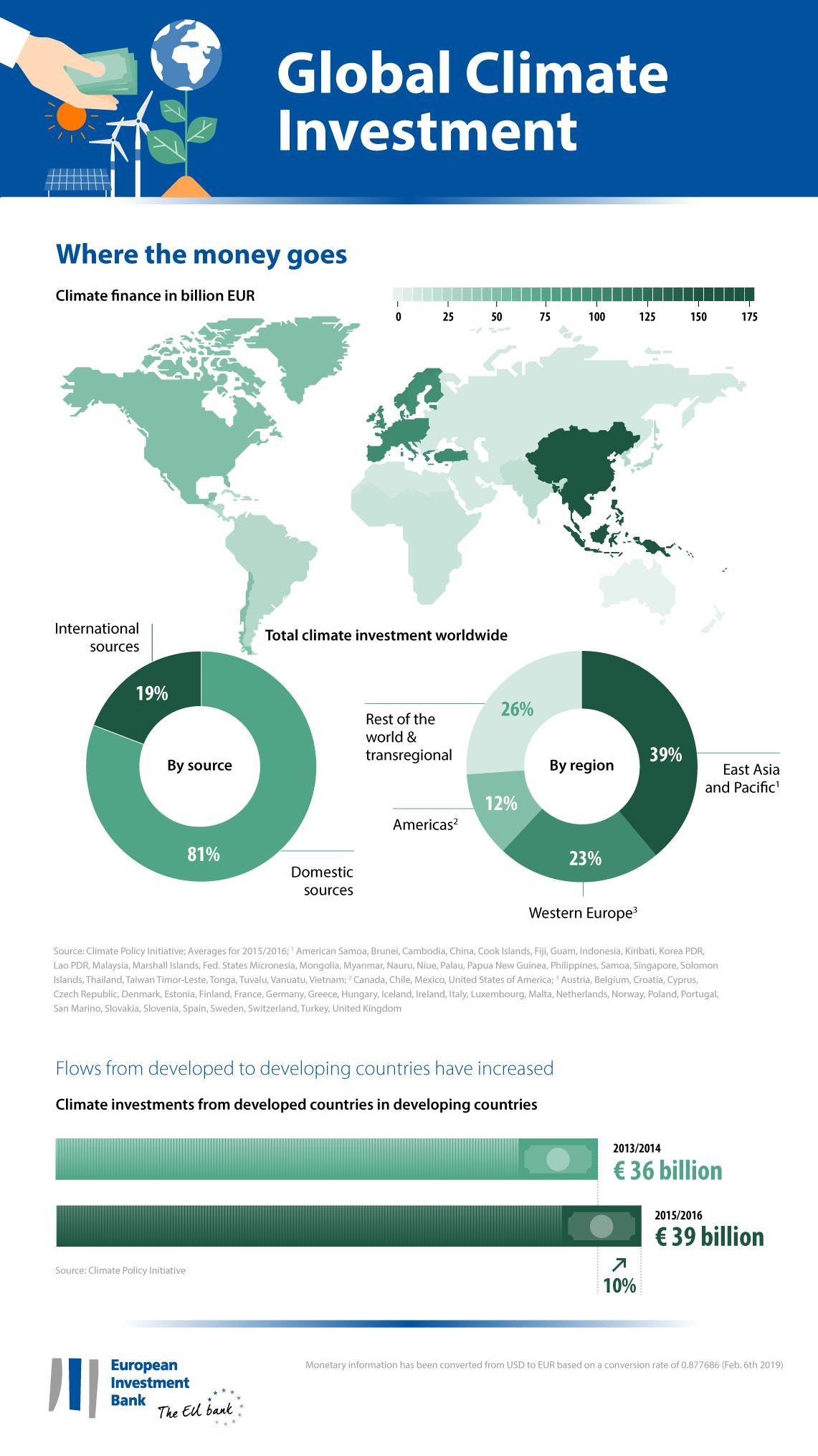Germans favour international investment as the key to mitigating climate change
The new tranche of EIB data reveals that the German public is more favourably disposed towards global investment in fighting climate change, than keeping funds only at the national level. 38% of Germans believe that Germany should invest in all countries in need, no matter what – 8% higher than in France and 10% higher than in the Netherlands. One in three Germans (32%) feels that investment in fighting climate change should be kept on German soil, with each country responsible for taking action within its own borders.
Young people in Germany aged 18-34 appear to have a more global outlook towards fighting climate change. 32% of people aged 35-44 believe that German investment in fighting climate change should be kept within Germany. Only 19% of young people aged 18-34 agree with this national focus, while 44% of young Germans believe that it is necessary to invest in climate mitigation initiatives in developing countries in order for Germany to make an effective contribution.
Prioritising national or international-level investment in combating climate change: French divided on the subject
The new wave of results demonstrates a divide in the French public regarding national versus global investment priorities for climate change. One in three French people (32%) feels that investment in fighting climate change should be kept on French soil, with each country responsible for taking action within its own borders. Meanwhile, 30% believe that France should invest in all countries in need, no matter what – 10% lower than in the UK and 8% lower than in Germany.
Young people in France aged 18-34 appear to have a more global outlook towards fighting climate change. 40% of young French people consider it necessary to invest in climate mitigation initiatives in developing countries in order for France to make an effective contribution. Only 25% of people aged 55 and over agree, while 42% believe that that French investment in fighting climate change should be kept within France.
Spaniards say international organisations should lead the fight against climate change
The Spanish public appears more favourably disposed towards global investment in fighting climate change, than keeping funds only at the national level. According to the survey, almost half of Spanish people (46%) believe that Spain should invest in all countries in need, no matter what – 16% higher than in France and 8% higher than in Germany and Italy. Meanwhile, one in four Spaniards (26%) feels that investment in fighting climate change should be kept on Spanish soil, with each country responsible for taking action within its own borders.
This global outlook is mirrored by the view of 36% of Spanish people that international organisations, such as the European Union, the World Bank and the United Nations, are the entities that should lead the way in the fight against climate change. In contrast, 27% of Spaniards believe that citizens should play the greatest role, by making personal efforts in their daily lives to lower carbon actions.
Swedes favour international investment as the key to mitigating climate change
The new tranche of EIB data reveals the Swedish public are more favourably disposed towards global investment in fighting climate change, than keeping funds only at the national level. 42% of Swedish people believe that Sweden should invest in all countries in need, no matter what – 12% higher than in France and 4% higher than in Germany and Italy. Meanwhile, almost one in four Swedish people (23%) feels that investment in fighting climate change should be kept on Swedish soil, with each country responsible for taking action within its own borders.
From a Swedish perspective, the national government along with international organisations, such as the European Union, the World Bank and the United Nations, are the entities that should lead the way in the fight against climate change, according to 48% of the public. 21% also voted for citizens to play the greatest role, by making personal efforts in their daily lives to lower carbon actions.
Italians favour international investment as the key to mitigating climate change
According to the new tranche of EIB data, the Italian public is more favourably disposed towards global investment in fighting climate change, than keeping funds only at the national level. 38% of Italians believe that Italy should invest in all countries in need, no matter what – 8% higher than in France and 10% higher than in the Netherlands. 27% of Italians feel that investment in fighting climate change should be kept on Italian soil, with each country responsible for taking action within its own borders.
The older generation appears to have a more national outlook towards fighting climate change. 29% of people aged 35 and over believe that Italian investment in fighting climate change should be kept within Italy. Only 21% of young people aged 18-34 agree with this national focus, while 39% of young Italians believe that it is necessary to invest in climate mitigation initiatives in developing countries in order for Italy to make an effective contribution.
Prioritising national or international-level investment in combating climate change: Poles divided on the subject
The new wave of results demonstrates a divide in the Polish public regarding national versus global investment priorities for climate change. One in three Poles (34%) believes that investment in fighting climate change should be kept on Polish soil, with each country responsible for taking action within its own borders. Meanwhile, 28% believe that Poland should invest in all countries in need, no matter what –12% lower than in the UK and 10% lower than in Germany.
Despite this leaning towards national investment, only 19% of Poles believe that their national government is the entity that should play the greatest role in combating climate change. 23% feel that international organisations such as the UN can play this role, but individual citizens were voted the leading entity for taking on this responsibility (36%).
